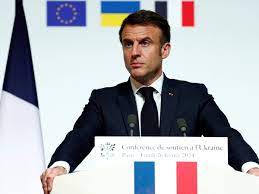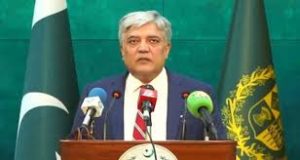Macron refuses to rule out putting troops on ground in Ukraine in call to galvanise Europe

Paris: France’s President Emmanuel Macron said on Monday he refused to rule out sending ground troops to Ukraine, but said no consensus existed on the step, at a meeting of 20 mainly European leaders in Paris convened by Macron to ramp up the European response to the Russian military advances inside Ukraine.
Protecting France’s strategic ambiguity he said “there is no consensus to officially back any ground troops. That said, nothing should be excluded. We will do everything that we can to make sure that Russia does not prevail.”
He pointed out that past shibboleths such as sending long-range missiles and planes had been cast aside, adding “people used to say give them just sleeping bags and helmets”. He said: “We must do whatever we can to obtain our objective.”
It is the first time there has been such open discussion of nation states collectively looking at providing troops to support the depleted Ukrainian military manpower.
Speaking at the end of the meeting, Macron warned: “There is a change in Russia’s stance. It is striving to take on further territory and it has its eyes not just on Ukraine but on many other countries as well, so Russia is presenting a greater danger.”
Among those present at the meeting were the German Chancellor, Olaf Scholz, the UK foreign secretary, Lord Cameron, the Polish president, Andrzej Duda, and the Dutch prime minister, Mark Rutte. Relatively junior officials attended from the US and Canada.
French officials have become worried there has been no single galvanising western force responding to Vladimir Putin putting his economy on such an effective war footing, and insufficiently clear practical responses had emerged from the west.
He said the meeting, called in haste by Macron in the wake of the Ukrainian frontline starting to crumble, had agreed to focus on five key action areas: cyber defence, joint production of military weapons and ammunition in Ukraine, defence of countries directly threatened by Russian offensives such as Moldova, greater military protection for Ukraine on its border with Russian-backed Belarus, and the demining of Ukraine. He also announced a new coalition to provide long and medium-range strike missile capability.
Insisting Russia’s defeat is absolutely essential for peace and security in Europe, he said it was necessary for Europe to move from words into action so clear decisions are made to build a European defence pillar independent of America.
Asked about the possibility of continuing to support Ukraine in the context of the US presidential elections this November, he said: “We cannot wait for the outcome of the American elections to decide what our future is going to be. It is the future of Europe that is at stake so therefore it is up to the Europeans to decide. If others want to join in and help, fantastic, but that is just an added bonus.”
He said this was necessary not because Europe was pessimistic, defiant or fearful but simply because it is Europe’s future at stake
Russia, he said, “cannot win this war. It is the sole aggressor. It is the sole country that instigated this war. Russia is now clearly affecting our own safety and security through both traditional and hybrid war.” But he added “we are not at war with the Russian people”.
At present, 30% of all funding for Ukraine came from Europe, Macron said, but added that it was possible to increase this through further bilateral and EU-level agreements so that ammunition supplies could be increased threefold overall.
He admitted Europe had failed to meet its over-optimistic promise to provide Ukraine with a million rounds of ammunition. He said the provision of ammunition was now the “top priority”, pointing to gunpowder shortages creating bottlenecks. But he asserted European countries had room for manoeuvre both to increase production in Europe, and also to purchase surplus ammunition stocks outside Europe to hand to Ukraine, a proposal advanced by the Czech Republic.
He again supported the Estonian plan for the EU to issue defence bonds to guarantee long-term defence markets for industry, a proposal that has not yet found favour in Germany or the Netherlands, two countries traditionally opposed to the issuance of EU debt. “There is a geopolitical shock coming from one side and that justifies what the Estonians have proposed.”
The objective, he said, was to ensure Ukraine can negotiate peace and return to full territorial sovereignty.





